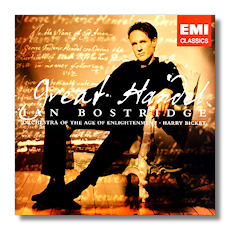
The Internet's Premier Classical Music Source
Related Links
- Handel Reviews
- Latest Reviews
- More Reviews
-
By Composer
-
Collections
DVD & Blu-ray
Books
Concert Reviews
Articles/Interviews
Software
Audio
Search Amazon
Recommended Links
Site News
 CD Review
CD Review
George Frideric Handel

Great Handel
- Semele, HWV 58
- "Where'er you walk"
- Messiah, HWV 56
- "Comfort ye my people"
- "Ev'ry valley shall be exalted"
- Serse, HWV 40
- "Frondi tenere e belle"
- "Ombra mai fù" - Largo
- La resurrezione, HWV 47
- "Cosí la tortorella"
- Acis and Galatea, HWV 49
- "Love sounds th'alarm"
- "Love in her eyes sits playing"
- "Happy we!"
- Ariodante, HWV 33
- "Scherza infida, in grembo al drudo"
- "Dopo notte"
- Samson, HWV 57
- "Total eclipse"
- L'Allegro, il Penseroso ed il Moderato, HWV 55
- "As steals the morn upon the night"
- Jephtha, HWV 70
- "Waft her, angels, through the skies"
- "Hide thou thy hated beams"
Ian Bostridge, tenor
Orchestra of the Age of Enlightenment/Harry Bicket
EMI Classics 382243-2 DDD 65:54
Nowadays a recital of arias by Handel is no rarity, but it is good to remember that it was not always so. As Ian Bostridge himself reminds us in his booklet notes for this release, only in the past few decades have Handel's operas and oratorios been given a new lease on life, as it were, because of a renewed interest in Baroque performance techniques, styles, and traditions. Once vocal recitals began with a token Handel aria, almost as a "warm-up" for both the singer and the audience. Now entire evenings of Handel's vocal works (other than Messiah) turn what used to be the appetizers into rightful main courses.
It says something about our times that Bostridge, who can't really be called a specialist in Baroque music (only because his repertoire is so broad), can make a full-length Handel CD that feels and sounds so right. However, as Bostridge relates, early in his career he did the rounds throughout England singing the tenor solos in Messiah with various regional ensembles. Perhaps it's true that if your vocal training has been thorough and thoughtful, there's less that lies outside your reach than otherwise.
The sharp-eyed will realize that there's been some "gender bending" in the construction of this recital. The title role in Ariodante originally was sung by a castrato, and today usually is sung by a mezzo-soprano, castrati being in short supply! Bostridge sings the two arias from this opera by taking them down an octave, and justifies the practice by citing a performance of Messiah, led by Handel himself, in which a tenor sang "Rejoice greatly" in the same manner. The real justification, however, is Bostridge's performances, which at no point had me wishing for the more "authentic" treatment. (If he wanted to sing the "Habañera" from Carmen, however, I'd probably have objections!)
Bostridge sings all of these arias with a refinement and sensitivity that is nevertheless totally masculine. He is the master of Handel's most florid writing, and enunciates the texts clearly but without exaggeration. (The booklet reprints texts and translations, but you won't need them.) He even is good at creating actual characters. His Samson, for example, is clearly a different person than his Jephtha. And indeed, "Waft her, angels," which closes this CD, would be an impressive bit of singing in any era, and is a fine example of the intelligence and vocal beauty that make Ian Bostridge such a valuable singer today. Harry Bicket and Orchestra of the Age of Enlightenment provide the full-blooded but always stylish accompaniments. Kate Royal, a recent EMI signing, and herself a possessor of a lovely voice, blends well with Bostridge in their two duets. This is an Abbey Road recording, and the engineering is excellent.
This is recommended to everyone, not just to Handelians.
Copyright © 2007, Raymond Tuttle




















